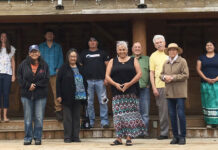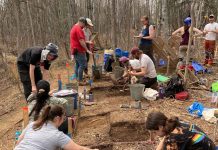by Beverly Sabourin & Peter Globensky
Despite thousands of years of Judeo-Christian biblical history, the value and values of what Western civilization has called progress can be traced to one of its earliest writings – the Book of Genesis. There an ambitious God boldly declares: “Let us make man in our image, after our likeness: and let them have dominion over the fish of the sea, and over the birds of the heavens, and over the cattle, and over all the earth.” That command, given without caution or qualification, can be considered the first license, the first authorized justification to subdue, exploit and too often, plunder and pillage the earth and its resources. It is a value-system which can be blamed full-throttle for the mess we as homo ”sapiens” are making here in our earthly home.
Whether it is called the land, Mother Earth, the natural environment, Gaia or nature, Indigenous peoples have traditionally had a profoundly different relationship with our earthly home than that displayed by Canada’s European and predominantly Christian colonizers. Through the centuries since our hemisphere’s original inhabitants found Columbus lost on the shores of Hispaniola, that profoundly different relationship with Mother Earth has assumed the stuff of legend. And like many legends, it is mostly true even if accompanied by a small dose of romantic myth.
Indigenous communities both past and present have often self-identified as stewards or caretakers of the land. That sprang in part from a deeply spiritual reverence for the natural environment and all of creation both animate and inanimate. Indigenous peoples were the first to understand the principles of ecology in action. A quote attributed to the Duwamish and Suquamish Chief Seattle summarizes in a nutshell what most of us have forgotten, “Humankind has not woven the web of life. We are but one thread within it. Whatever we do to the web, we do to ourselves. All things are bound together.”
So much for Genesis and subduing the earth!
However, that reverence and stewardship of the land came from an extremely practical assessment of survival! They understood the sun and its seasons, the growth and careful harvesting of plants and crops, the movement and life-cycles of fish and game, the limits to capture and kill. It was quite simple and straightforward. If they did not observe, gather and record into memory this Indigenous knowledge, they would starve. Their very survival depended on their stewardship. That enhanced their reverence for nature, it’s interrelationships and the awe with which creation was held.
As a result of the relentless onslaught of colonialization, the “triumph” of European and Christian values and the achievements of our economic models, Mother Earth has become so subdued it is now yelling in pain. We ignore her cries at our peril. As the earth warms dangerously, as biodiversity succumbs to monoculture, as species are rendered extinct, as human migrants overflow, as we reject our stewardship responsibilities in the face of this juggernaut of progress, we are generating the genesis of our own extinction. Much of the science is beginning to infer that at our “current rate of progress” humankind may be lucky to escape this century alive!
Whether it is the decline of sea ice in the Arctic, melting of the permafrost, the change in caribou migration patterns or the alterations to animal and fish habitat, it is painfully ironic that the primary victims of global warming and its causes are Indigenous peoples. That irony will now be compounded by the increasing loss of Indigenous Traditional Knowledge (ITK) which has proven to be so reliable in our assessment of human-caused impacts on the environment. ITK is, at once, historical and experiential knowledge based on successive generations of observations, emanating from community memory and oral tradition. It is knowledge that is accumulative and dynamic and is now so highly regarded that it is a required, essential part of any environmental assessment process where the traditional rights and lands of Indigenous people may be impacted by any human activity that will fundamentally alter the landscape. This covers a wide swath of Canada.
The irony here is that the changes wrought by global warming will be so fundamentally broad and widespread that the knowledge of previous Indigenous generations will carry little meaning in the new emerging landscape. The migration and calving habits of caribou known by communities for generations will be of little use if there are no longer any caribou!
So why do we in the West seem so hell-bent on squandering our natural capital and inviting what scientists are calling the sixth extinction? We will explore in Part Two how the elevation of convenience to the status of inalienable right may well mean our demise.
Beverly Sabourin is a former Director of the Indigenous Access Program at Red River College and retired as the Vice-Provost of Aboriginal Initiatives at Lakehead University and is a member of the Pic Mobert Ojibwe. Peter Globensky is a former senior policy advisor on Indigenous Affairs in the Office of the Prime Minister and retired as CEO of the Canadian Council of Ministers of the Environment. They invite your comments at basa1@shaw.ca






